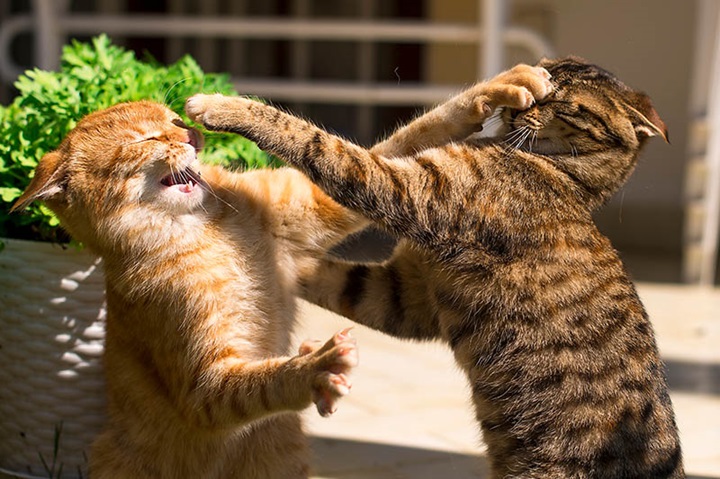Fights between cats can often look intense, loud, and dangerous. Especially among outdoor, stray, or feral cats, these altercations might seem brutal. But do cats actually fight to the death? While cats are capable of causing serious injuries during fights, the idea that they intentionally kill one another is a myth in most domestic and wild scenarios. These animals usually engage in fights for survival, dominance, or territory—but rarely with the intention to kill.
Reasons Cats Fight

Territory Disputes
Cats are naturally territorial creatures. They develop a strong attachment to their space, whether it’s a yard, a neighborhood alley, or a room in a house. If another cat enters what one considers its territory, a confrontation may occur. These fights are usually about scaring the other cat away rather than causing fatal harm.
Mating Competition
Unneutered male cats are more likely to fight aggressively, especially during the mating season. They will fight over a female cat in heat, often engaging in loud and violent battles. These conflicts can lead to injuries but rarely escalate to the point of death unless medical care is unavailable and infections develop.
Hierarchical Tensions
In a multi-cat household or colony, hierarchy plays a vital role in maintaining order. Sometimes cats may challenge one another to assert dominance. These conflicts help determine social rankings, and although they can turn physical, they are more about asserting control than eliminating rivals.
Fear-Based Aggression
Cats also fight out of fear. When they feel cornered or threatened, they might lash out as a defense mechanism. These fights usually end quickly once one of the cats finds an escape route or becomes submissive.
Are Cat Fights Lethal?
Although cat fights may appear aggressive, they rarely result in death. Most confrontations are short, lasting only a few seconds. A typical fight might involve growling, hissing, chasing, and a few swipes with claws. Physical fights that go beyond that usually result in scratches or bite wounds rather than fatal injuries.
The most dangerous outcomes of cat fights are not immediate death but the infections and complications that follow. A bite wound can lead to abscesses or infections like feline leukemia virus or feline immunodeficiency virus. Without veterinary care, these conditions can become severe and, over time, lead to death.
Signs a Fight May Happen
Cats give off several warning signs before they engage in a physical fight. Recognizing these signs early can help prevent injuries:
- Ears flattened or turned back
- Growling or deep meowing
- Hissing or spitting
- Stiff-legged posture or puffed-up fur
- Intense staring without blinking
If you observe these signals, it’s best to redirect the cat’s attention or separate them to avoid escalation.
How Serious Can Injuries Get?
Although cats don’t usually fight to kill, the injuries they inflict can still be serious. Bites often go deep beneath the skin, which can trap bacteria and result in abscesses. These infections are painful and can cause fever, swelling, and lethargy.
Additionally, some cats may transmit diseases through saliva, especially during deep bites. Cats that are not vaccinated or treated may develop complications, potentially leading to death if left unattended.
Feral Cats vs. House Cats
Feral cats are more prone to dangerous fights due to their lack of human supervision and medical support. They often compete for food, shelter, and mates, making their environment more aggressive. Injuries in the wild are more likely to become infected or go untreated.
House cats, on the other hand, typically live in more controlled environments. Although they may still fight, especially if not introduced properly or if stressed, the likelihood of fatal outcomes is significantly lower. Owners can intervene, treat injuries, and reduce conflict through proper care and environment management.
Do Female Cats Fight?
Male cats are more likely to engage in intense fights, especially when unneutered. However, female cats are not entirely peaceful either. They can fight over food, territory, or space, particularly if they are not spayed. Mother cats are especially protective of their kittens and may fight off any animal—cat or otherwise—that comes too close.
Can Cats Kill Each Other?
While rare, it is possible for one cat to kill another. However, this typically happens under extreme conditions. If one cat is significantly stronger, older, or more experienced, and the weaker cat cannot escape, fatal injuries could occur. More often, however, death results from untreated infections, stress, or lack of access to resources following a serious fight.
Preventing Cat Fights
Spay and Neuter
One of the most effective ways to reduce aggression in cats is through spaying and neutering. It reduces the hormones that drive territorial and mating behavior, making cats calmer and less likely to fight.
Proper Introductions
When introducing a new cat to your household, it’s essential to take it slow. Cats need time to get used to each other’s scent, sounds, and presence. Use baby gates, closed doors, or slow meetings to ensure a smooth transition.
Provide Enough Resources
Cats may fight if they feel there’s a lack of resources. Ensure each cat has access to food bowls, water, litter boxes, and resting spots. Adding vertical spaces like shelves and cat trees can also help by giving cats more places to escape or claim as their own.
Enrichment and Play
Bored cats may become agitated and more likely to fight. Engage your cats in daily play using toys, interactive feeders, and activities that stimulate their hunting instincts. Mental and physical stimulation can lower stress and prevent fights.
Watch for Health Problems
Cats sometimes act aggressively when they’re in pain or sick. A cat that suddenly becomes hostile may be dealing with an underlying health issue. Regular veterinary checkups can help catch problems early and maintain a peaceful home.
What to Do During a Fight
If a cat fight breaks out:
- Don’t attempt to grab them with your hands.
- Make a loud noise to startle them.
- Toss a pillow or soft object near them to interrupt the fight.
- Use a squirt of water if nearby.
- If needed, place a barrier like cardboard between the cats.
After breaking it up, keep the cats apart for a few hours or days to let them calm down before reintroducing them slowly.
Can Cats Die from Stress After a Fight?

Stress in cats is real and can have physical effects. Prolonged stress from repeated fights or a high-conflict environment can suppress the immune system, making a cat more susceptible to illness. While it’s not common for stress alone to cause death, it can contribute to health issues that worsen over time.
Summary
Cats are naturally inclined to fight under certain conditions—territorial disputes, mating, or fear. However, fighting to the death is extremely rare. Most cats aim to scare off rivals rather than eliminate them. The real dangers come from injuries, infections, and long-term complications rather than the fight itself.
With proper care, responsible ownership, and preventive strategies, cat fights can be avoided or quickly resolved. Understanding the causes and warning signs of aggression allows cat owners to create a safe, peaceful environment where their pets can thrive without conflict.
FAQ
Can two house cats kill each other?
It’s extremely rare. Fights can cause injuries, but death usually results from infection or untreated wounds, not the fight itself.
Why do my cats suddenly start fighting?
Sudden aggression can be caused by stress, changes in routine, illness, or redirected aggression from outside stimuli like seeing another cat outside.
Do cats fight more at night?
Yes, cats are more active during dawn and dusk. If outdoor cats encounter each other during these times, fights are more likely to occur.
Can cat fights cause long-term behavior changes?
Yes. A traumatic fight can lead to anxiety, hiding, or increased aggression in some cats. Early intervention and positive reinforcement help reduce stress.
Should I separate my cats permanently after a fight?
Not always. After giving them time to cool off, reintroduce them slowly and monitor their behavior. Permanent separation is only needed in extreme cases.




